Over one hundred people from different churches in Shoreline gathered at Shoreline Community College Thursday May 3, to pray. The theme of the National Day of Prayer was Unity. 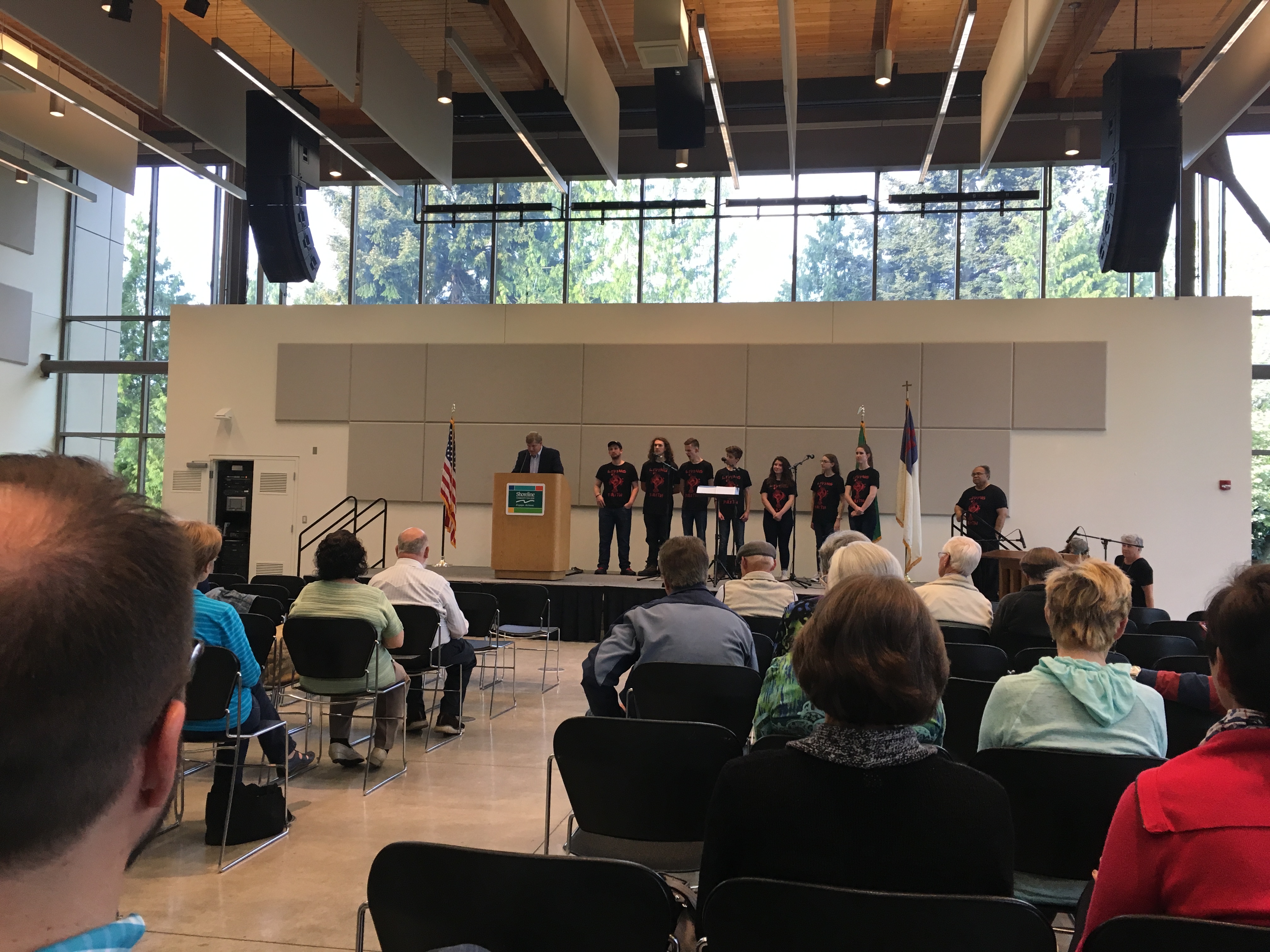
National Day of Prayer May 3, 2018
Patriot Day Prayer This Monday 9/11/2017
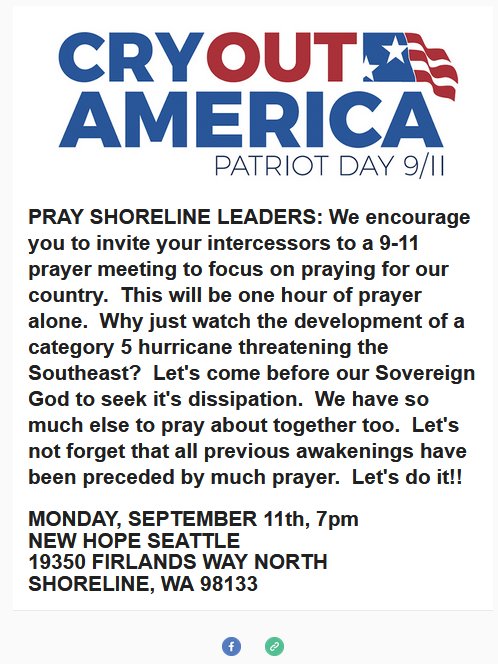
Four C’s of Connection in Church Planting and any Collaborative Effort
The four C’s of Connection in Church Planting, and Every Collaborative effort
Nathan Hawkins Stadia Regional Executive – West
Collaboration is a buzz word. Cooperation is all the rage, especially among millennials. It can be fun, it is necessary to get certain things done, especially in Church Planting. Rarely is this exciting and complex method considered as a process or on a scale. Here are what I share as the four C’s of Connection in Church Planting, they also apply in every collaborative effort. I’ve certainly adapted and adopted these ideas from many, the fact that I cannot correctly attribute them is one of the issues with collaboration.
Each C is a step on a scale towards complexity, with corresponding potential greater risk and reward. Communication and coordination must increase for progression.
1. Compete – Are we working toward the same end? Does blowing out your candle cause mine to burn brighter? Is it a zero-sum game where for me to win you must lose? Some things are rightfully competitive; Kingdom Expansion, Church Multiplication is not about competition. Our friends at New Thing Network talk about the four A’s of Movement: Awareness, Agreement, Alignment, and Accountability. New Churches are not competition for one another or existing Churches; we need to agree on this before we can align any further.
2. Complement – Every person and organization has a mission, a purpose or objective that drives them. Our missions are like fires we’ve been entrusted to tend. We can add fuel to another’s fire based on our expertise, abundance, and Kingdom-mindedness. Complementing another may not cost much, it does not mean integration. In fact, complementary efforts involve strategic alignment versus redundancy, recognizing the value of other’s work and helping them do what they do best. To complement is to add value without any reciprocation, it is a gift.
3. Cooperate – Thoughtfully and intentionally aligning two or more fires can mean situating them closer together so they collectively are more visible, or spacing them out so they can light a longer path. Strategic proximity requires increased communication and coordination, but it still does not necessitate integration. For example, when Stadia helps churches host Church Planting Residencies, we encourage them to cooperate by bringing residents together for strategic shared learning, but not to collaborate by sharing or swapping residents. Cooperation is alignment in the same direction without intersection, like rails. It does not even always require alignment on distance (where) or speed (when), cooperation is about the way (how).
4. Collaborate – The highpoint of connection involves at least some integration of effort, and often resources. This is painfully difficult and often why collaboration breaks down early on. Progressing from the relatively low bar of recognizing we are not in competition to the high bar of integration is facilitated by complementary and cooperative intermediary steps. Collaboration involves continual and mutual reprioritization of the mission. Integration reduces redundancy, it is about stewardship, yet it is often inefficient initially. Time and continual realignment prove collaboration is most effective for long-term initiatives. Ego is the enemy of Collaboration.
Trust is the foundation collaboration is built upon, it is developed as we endeavor and experiment openhandedly, make adjustments, graciously moving through stages together. This process can only be expedited through shared liminal experiences, more often it takes time, in either case it can be painful. I am convinced collaboration is worth the cost. Nothing is more God honoring or Kingdom minded than believers working together. Jesus prayed for collaboration in John 17, that we would be unified so that the world would know God’s love. What else is worth collaborating for?
Next Steps/Reflection Questions
– What are you called to that will benefit from collaboration and where are you at on the scale of the Four C’s?
– What intentional steps can you take to progress on the scale toward collaboration? With who? When? Why? How?
– In areas where you are collaborating, how do you and your collaborators need to reprioritize and realign, individually and collectively, for the sake of the overarching mission?
Compassion International tour a village in Ethiopia and Dominican Republic Shoreline Free methodist Church Nov 11-14th
https://changetour.compassion.com/press-resources/seattle/
More than 700 million people in developing countries live on less than $1.90 per day, facing challenges most Americans never will. Compassion International’s The Compassion Experience is making a four-day stop in the Seattle area November 11-14 and will bring visitors on a journey into the lives of two Compassion-sponsored children living in Ethiopia and the Dominican Republic. The event will be hosted by Shoreline Free Methodist Church at 510 NE 175th St. in Seattle.
A self-guided tour will immerse visitors in the lives of the children. Through the use of an iPod, a headset and 1,700 square feet of interactive space, visitors will see the children’s homes, walk through schools and markets, and hear life-changing stories of hope—all from the perspective of a child whose life began in poverty. This free event is appropriate for all ages and is an excellent opportunity for anyone who has never had the chance to travel outside the U.S. to get a small glimpse of what life can be like in developing countries.
Visitors are encouraged to make a reservation, however walk-ins are welcome. Groups of 20 or more should email changetour@compassion.com to reserve their space. For more information about “The Compassion Experience”, visit www.compassionexperience.com, @compassion_exp on Twitter, and www.facebook.com/compassionexperience on Facebook.
WHO:
Seattle-area residents — all ages welcome
WHAT:
An interactive tour through the life of a child living in a developing country
WHEN / WHERE:
November 11-14, 2016
Shoreline Free Methodist Church
510 NE 175th St.
Seattle, WA 98155
Oct 27,2016 Prayer meeting seeking God about racial reconciliation. Berean Bible Church 8:00am
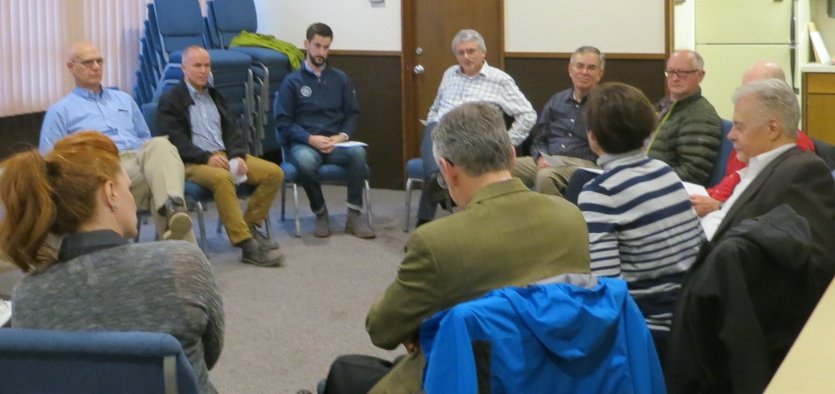
Attending: Steve Ulmer, Trevor Harris, Tom Ruhlman , Jimmy Skeen, John Bjorge, Svien Bjorge, John Aydelott, Ron Brooks, Ginny Chapman, David Marshall, Chris Johns, Jessica Ketola, Scott Sund, Bill Bear, Don Horrell and Jim Shemaria. Sixteen church leaders.
Introductions, A time of prayer and thanksgiving in small groups. A discussion followed. I might have missed some of the thoughts expressed. Sunday morning many worship services are a majority of one racial or ethnic group. Westgate has a very diverse congregation. People come from 35 nations, unified by common faith. Exchanging pulpits can overcome some barriers to reconciliation. This does happen especially where some congregations share a building. In contrast to a Sunday worship service, when the community is being served by a community dinner, then a more diverse group of people show up. Another diverse group at a church is the basketball court Wednesday evening filled with the many cultures in community nearby. Commonality of the sport overcomes differences. Churches like people have different gifts. Outreach to people who are hurting can overcome bias of different cultures. Addiction recovery is another community outreach that brings together people of different backgrounds. Racial and ethnic differences have sometimes perceived as an them vs. us perspective. Some of our group here today, have people in our own families that are different ethnicities. It changes the way you understand Black lives matter when it is your own children or grandchildren. To overcome the separation of groups we need to initiate the conversation. Take the pastor or person of a different race or ethnicity out to lunch. We need to make friends with people different then us.
We go across the world to do mission work but are reluctant to cross the street to connect with a neighbor from a different culture or race. We have separate congregations but all the kids from both congregations come to AWANA. We need to hold some joint services or celebrations like thanksgiving meal together with different ethnic congregations. Is our church/worship service welcoming to the people new to our country or community? Having flags from every nation represented in the congregation can help.
Shoreline of even twenty years ago was almost entirely white / European. Today the white population is becoming minority. Our Sunday morning services reflect the old Shoreline demographics but the future of the church depends upon us learning to embrace cultural and racial diversity. Perhaps what we should focus on is integration instead of reconciliation. We all want our congregations to reflect the diversity of our community but the reality is a Black children report they fear being attacked because they are Black. This is a result of institutionalized racism. Black people are far more likely to be stopped by police simply because they are Black.
There is an achievement gap for minority students in our schools. Many White children experience coming home and there is a parent to help with homework. For many minority children, recent immigrants, and those with parent(s) working the child is unable to get help with homework. Tutors and positive adults in the lives of minority students can do a lot to change their lives and show that someone besides their parents values them. We have done school grounds landscaping. We could be changing the academic and spiritual landscape if we can encourage our congregations to engage with the students in the school room and school yard. Schools actually are begging for our help. Churches in close proximity to a school could develop a partnership with principle, parents and teachers.
Refugees and immigrants are arriving from different parts of the world than in the past. No longer are they mainly from Europe, and Asia but most are from Africa, and the Middle East. Jesus / New Testament give examples of how to embrace these folks: the Good Samaritan, the 10 lepers, the woman at the well and Philip meeting the Ethiopian eunuch. We are commanded by Jesus to agape’ our neighbor even if they are different than us in race or culture or religion. Even if it is costly or embarrassing for us to do so. From Dr. Martin Luther King’s sermon on the parable of the Good Samaritan: “His question was not, what will happen to me if I stop to help this man? His question was, What will happen to him if I don’t? “
Scott Sund closed our time in prayer for us as the Church and us as the community to be reconciled. We agreed to meet again and invite others who were not here to join, especially those who are from different ethnic backgrounds.
Rethinking Why We Help Others.
Rethinking Why We Help Others. July 23, 2016
I believe it is part of human nature to want to help others. I am a follower of Jesus who struggles with workaholic and codependent behavior as a means of avoiding my own thoughts and feelings around the trauma I experienced as a child. Some of my human compassion for others comes from my own hurts. Empathy for others can provide understanding, especially when there has been some healing and freedom. The healing experience can provide insight into what works and what doesn’t help as well as provide hope. I don’t believe I can heal anyone. But I do know that Jesus can and does heal people and He can use us in this process. In fact Jesus wants to use us in healing. I have prayed for many people for healing. I have witnessed many ordinary and some miraculous healings. I used to think I had this figured out. I believe Jesus loves everyone and the healing He does is an expression of that love.
But my involvement in the healing process is for my growth. Jesus purpose for me is not so much that I become effective in the healing ministry. Instead it is so that I may become more like Jesus. When Jesus heals someone, it is not His ultimate goal for that person. For, we are not just called to become believers and followers of Jesus. No. We are called to do that so that we can be used to make other people able to, lead other people to, lead other people …. In order to become people who lead other people to become disciples, that is people who learn how to do that well. I need to start by saying I am not very good at this. But I am willing to learn by doing. – Bill Bear
Be a host family for a homeless youth from the Shoreline Area News
Be a host family for homeless youth – presentation July 15
Posted: 01 Jul 2016 11:25 PM PDT
Did you know that 388 students in the Shoreline School District are currently experiencing homelessness?
The YMCA matches young adults, ages 18-24, who are homeless or at imminent risk of becoming homeless with a caring and supportive host family within King County.
Host families are volunteers from the community who are willing to provide young people with the support needed to develop independent living skills and a safe space to work toward becoming stable and self-sufficient.
Find out how you can be part of the solution!
Friday, July 15, Zero: People Experiencing Homelessness will offer a presentation: YMCA Host Homes – A methodology to house young people 18-24. July 15, 2016, 6-7:30pm at Shoreline Community College, 16101 Greenwood Ave N, Shoreline 98133, Room 1713. Free Parking after 4pm. (campus maps)
For more information, contact Guru Dorje via email or at 206-533-6733.
Guru.dorje@kingcounty.gov
June Church Leaders lunch at Shoreline Community Church
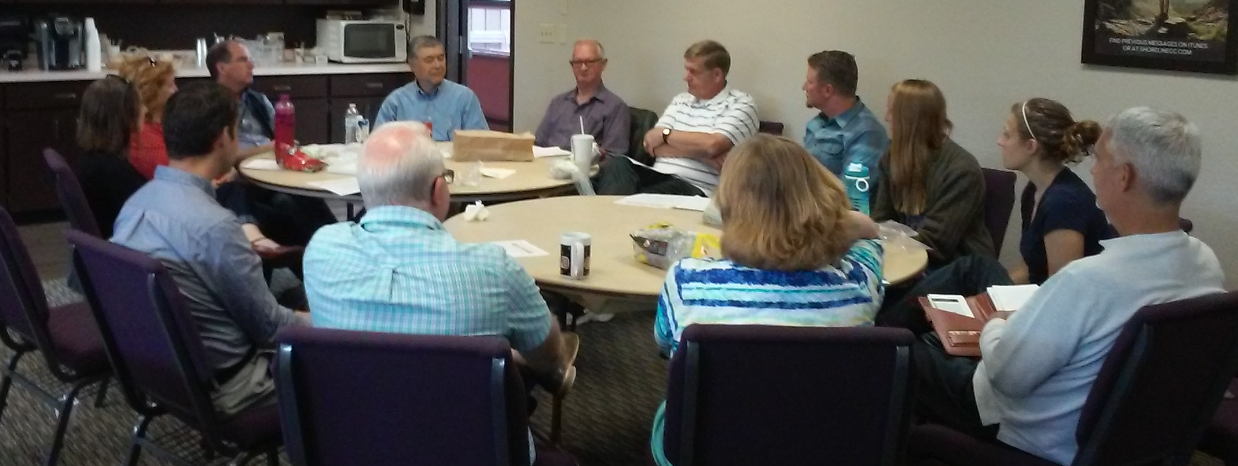
Meeting for lunch and fellowship. Churches represented Hope Bible Fellowship Shoreline Community, Berean Bible, Shoreline Full Gospel, Tabernacle Baptist, New Hope Seattle, Korean First Christian, Shoreline School Emergency Response,Re-Make Christian Fellowship, Stadia and the Union Gospel Mission. We discussed the ways in which churches could support the Foster Care Engagement process. We had an the example of a gift box we could assemble for the children waiting for placement at a DSHS office. We talked about how we might encourage members of our congregation to become on call childcare for these children while they in the office. See http://www.lightupthecity.org/#!foster-care/h26ec.
There are no lunches planned for July and August
August 20th and 21st many churches are participating in a serve day focusing on partnerships with our local schools. Contact Steve Ulmer for information steve@newhopeseattle.org
War room showing this Sunday April 24th 5:30 at Northwest Church
 Address 15555 15th Ave NE Shoreline WA 98155. This is a very well done movie about spiritual warfare.
Address 15555 15th Ave NE Shoreline WA 98155. This is a very well done movie about spiritual warfare.
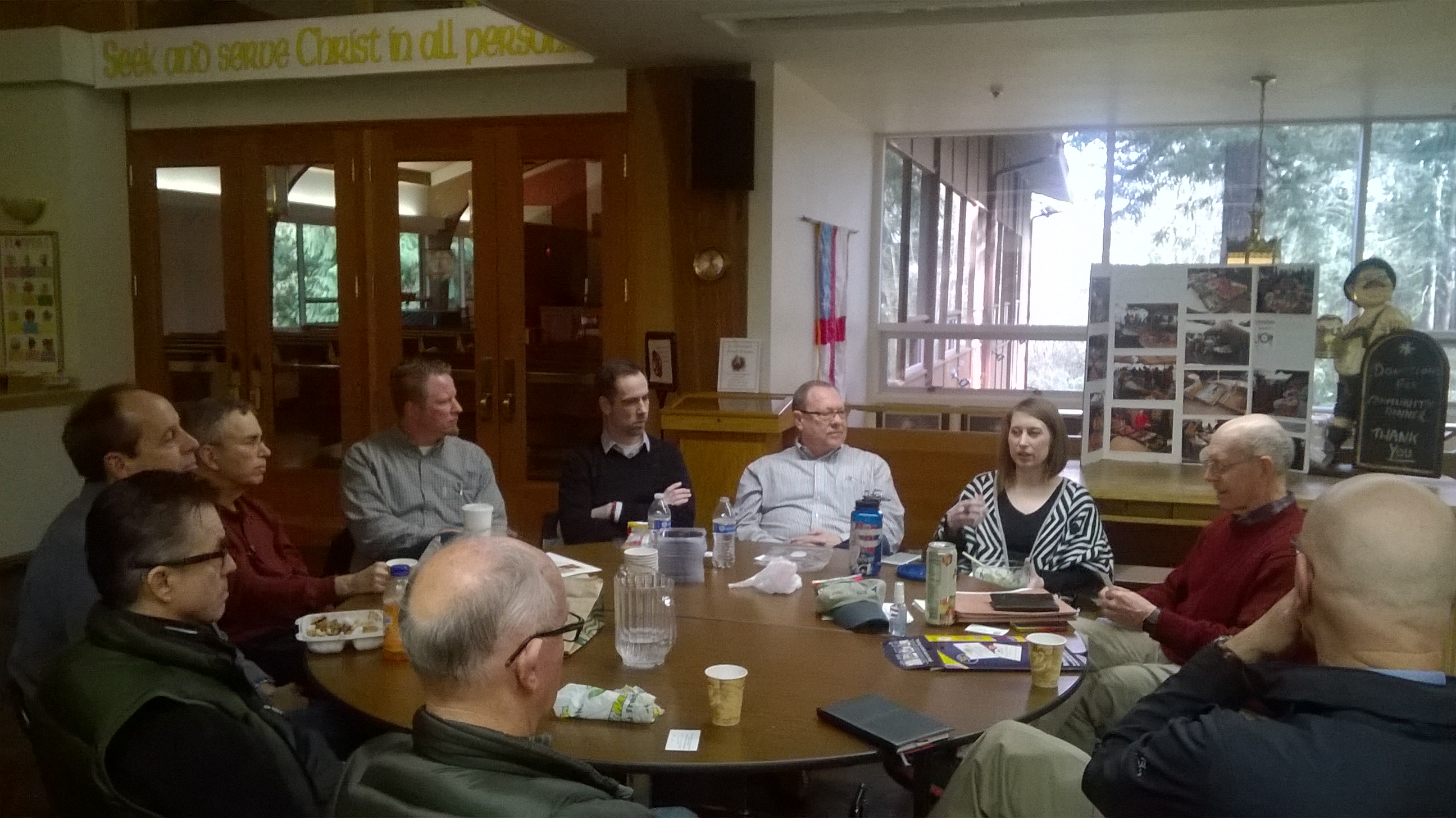
St. Dunstan Church, March 10 Church leaders from the Shoreline area discussing church school partnerships, food packs for kids, screening of the movie Saved for a Reason and Celebrate Recovery. The meeting rotates to a different location every month on the 2nd Thursday. April will be at Shoreline Free Methodist Church
Recent Comments